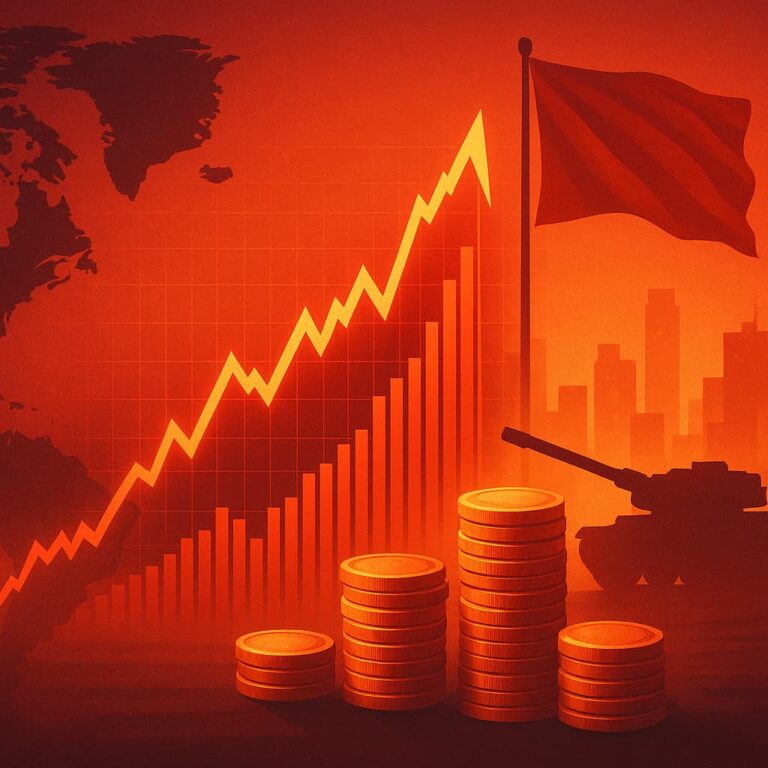Geopolitical tensions have always influenced financial markets, but few rivalries carry as much weight as the ongoing conflict between Israel and Iran. In 2025, the escalation between these two nations is not just a regional concern—it’s reverberating through global commodity prices, investor sentiment, and overall market volatility.
Oil Prices Surge on Middle East Instability
The Middle East remains the heartbeat of global oil supply. When military activity threatens that supply, energy markets react instantly.
Why Oil Markets Are Sensitive
- The Strait of Hormuz, a critical oil chokepoint, sits within striking distance of both Iranian and allied military positions.
- Even a partial disruption to supply chains or exports can send prices soaring due to perceived scarcity.
2025 Price Movements
- Brent crude jumped above $110 per barrel following Israeli airstrikes and Iranian missile deployments.
- Strategic reserves in the U.S. and EU were tapped to ease short-term supply fears.
- OPEC+ faces renewed pressure to stabilize markets, but production capacity is limited.
Gold as a Safe Haven Asset Reasserts Itself
When geopolitical uncertainty rises, gold typically becomes a preferred asset—and the Israel–Iran conflict has reaffirmed that historical pattern.
Flight to Safety Dynamics
- Investors retreat to gold as a store of value during periods of conflict and inflation.
- Central banks in emerging markets increased their gold reserves in Q1 2025 as a hedge against currency depreciation.
Gold Market Trends
- Gold crossed the $2,200/oz mark, nearing its all-time high.
- ETFs tied to gold saw inflows spike by over 30% compared to the previous quarter.
- Crypto assets, while still popular, have not displaced gold’s role as a crisis hedge.
Global Equities Rattled by Geopolitical Shockwaves
Equity markets thrive on stability. Armed conflict between two major regional powers—especially in a sensitive area like the Middle East—introduces uncertainty that causes global investors to reduce risk exposure.
Equity Performance Snapshot
- U.S. and European indexes saw a sharp decline of 3–5% in immediate response to the conflict escalation.
- Emerging markets, particularly in the MENA region, experienced heavier losses.
- Defense sector stocks rallied, while travel, energy-intensive industries, and frontier market ETFs took a hit.
Investor Sentiment and Volatility
- The VIX (Volatility Index) spiked above 25 for the first time since late 2023.
- Institutional investors increased cash allocations, signaling risk-off behavior.
- Retail traders shifted toward dividend-paying and low-beta stocks.
Currency and Bond Market Reactions
Beyond oil and equities, currency and bond markets are also responding to uncertainty and capital flow shifts.
Currency Impacts
- The U.S. dollar and Swiss franc strengthened as global reserve currencies.
- Regional currencies like the Turkish lira and Israeli shekel faced pressure due to proximity risk.
Bond Market Movement
- Yields on U.S. Treasuries declined as investors sought safer assets.
- Risk premiums widened on corporate and emerging market bonds, reflecting flight-to-safety sentiment.
The Broader Economic Implications
The conflict is not limited to commodity price swings or temporary market dips—it’s shaping inflation expectations, trade policy, and defense spending priorities.
Inflation Reignited?
- Rising oil prices could reignite inflationary pressure in economies still recovering from the 2022–2023 cycle.
- Central banks may delay rate cuts or even resume tightening if energy costs persist.
Global Trade and Supply Chains
- Shipping insurance rates for vessels near the Persian Gulf have surged.
- Energy-importing nations like India and China are facing potential price shocks.
Defense Sector Spending
- Countries across Europe and Asia are reassessing military budgets and security alliances.
- Defense ETFs and military-tech stocks have posted year-to-date gains exceeding 15%.
Strategic Moves for Investors in 2025
Geopolitical risk is difficult to price, but investors can take strategic actions to reduce exposure and capture potential upside from resulting market shifts.
Diversifizierung des Portfolios
- Diversify across sectors, geographies, and asset classes to reduce concentration risk.
- Include commodities and inflation-protected securities as hedges.
Stay Liquid and Nimble
- Maintain higher cash or short-term bond positions to respond to rapid market changes.
- Avoid overexposure to high-volatility or frontier markets.
Watch Defense, Energy, and Gold
- These sectors often outperform during conflict periods.
- Look for companies with strong fundamentals and government contract exposure.
Final Thoughts: Managing Through Geopolitical Tension
The Israel–Iran conflict has reignited a familiar pattern—oil spikes, gold rallies, equities wobble. While these reactions are rooted in decades of market behavior, today’s interconnected financial system means shocks travel faster and deeper.
Investors in 2025 must remain informed, disciplined, and flexible. Geopolitical uncertainty is not going away, but with the right strategy, it doesn’t have to undermine long-term success. Understanding how markets react—and how they recover—will be critical in turning risk into opportunity.





